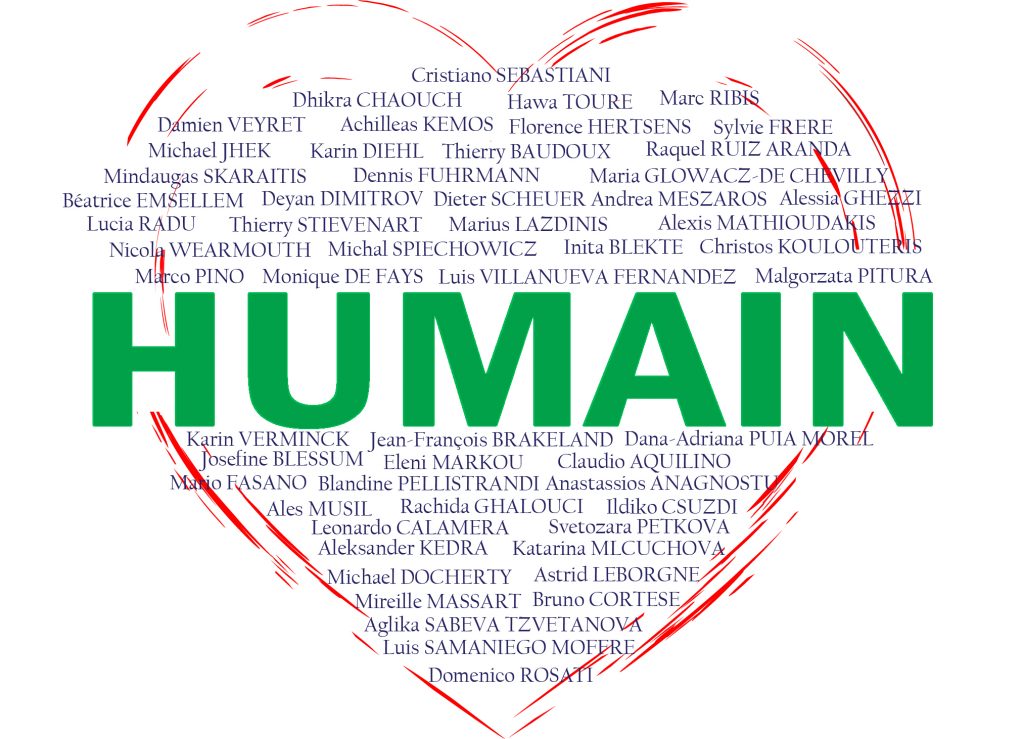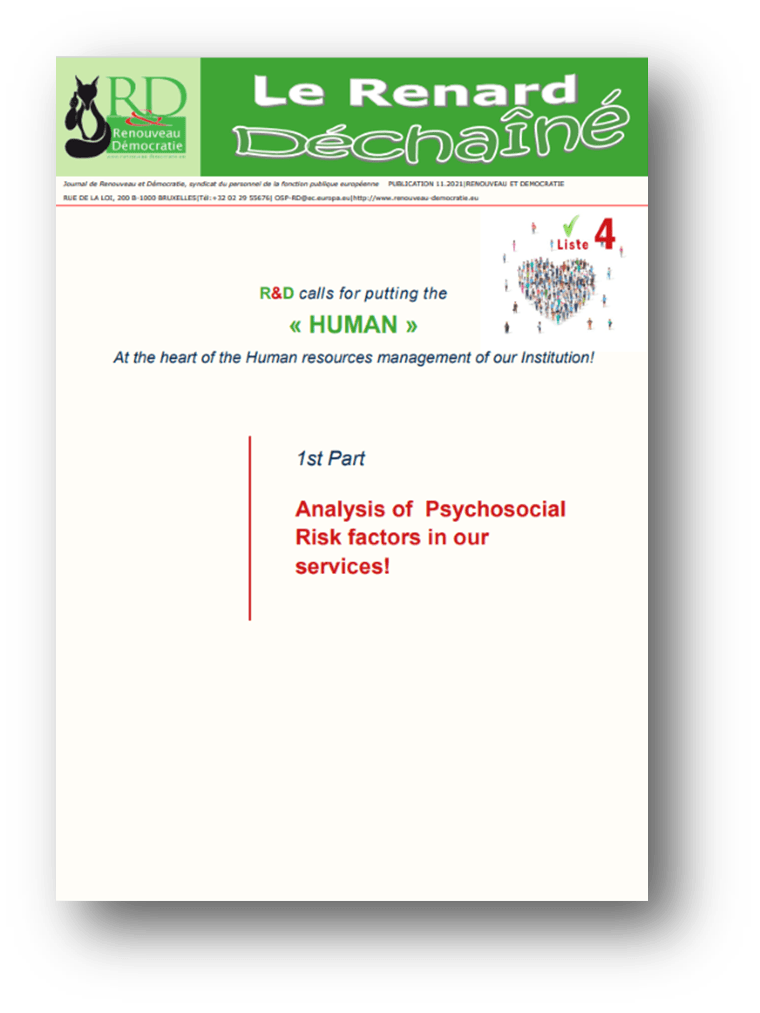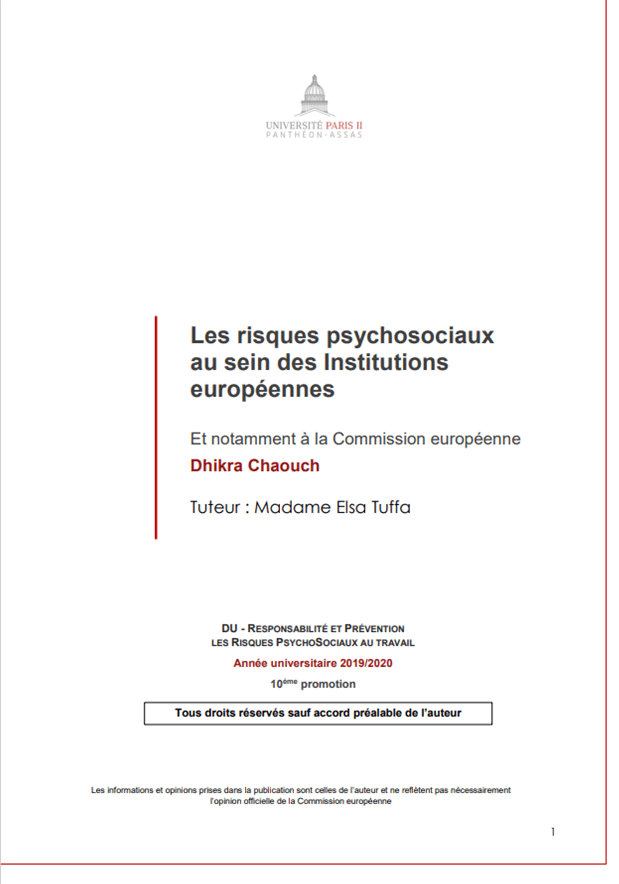R&D calls for putting the « HUMAN »
At the heart of the Human Resources management of our Institution!
1st Part – Analysis of psychosocial risk factors in our services!
You are the backbone of the institution and the European Union!
Without you, the European project would never have evolved so well towards policies that serve citizens.
From 280 agents in its beginnings (1953), the Union currently has around 60,000 staff members.
Its main asset is the unparalleled expertise of which you are the depositaries. Scientists, lawyers, economists, translators, interpreters, policy makers and administrators with a wide range of experience and support staff are making the Commission a breeding ground for know-how and experts! Your expertise is unparalleled at global level and it is sought!
According to the experts, “several contributors to European integration are using it to legitimise a decision presented as the application of principles recognised as neutral and universal, whether for a scientific, technical or legal reason” (Robert 2012)
And yet, in every crisis, staff become the target of the Member States and suffer psychological mistreatment!
In each crisis, Member States decide to drastically cut the budget allocated to staff without taking into account human beings, the consequences of their decisions in terms of both the health of the staff and the health of the institution.
According to the Court of Auditors’ report (link), the 2004 reform resulted in savings of € 8 billion in salaries and pensions between 2004 and 2020 and savings of € 24.8 billion in pensions between 2010 and 2059. The 2014 reform resulted in savings of € 2,7 billion on salaries and pensions between 2014 and 2020 and € 19,2 billion in savings on pensions between 2014 and 2064. There is also a saving of € 1,4 billion between 2014 and 2020 in the lower adjustment of salaries and remuneration (see The reforms of the Staff Regulations file)
Substantial savings on the back of staff who are asked to work ever more and always with less!
Researchers discussed the different consequences of these decisions, but only on the impact at the level of European policies and never on the psychosocial risk factors caused by these drastic cuts.
The weight of society, the decisions of the Member States, the opinion of the media, public opinion and euroscepticism… have a major impact on the working life and de facto on the private life of staff.
The founding fathers built Europe on values of universalism and sympathy to ensure peace between peoples. The EU places people at the heart of action, but what about the future of its staff as ambassadors of these values?
Before proposing a human-centred policy, it is essential to analyse risk factors and provide solutions according to scientific literature. This is what R&D did!
R&D is not limited to mere slogans and bases its analysis on the best scientific studies. R&D calls on the best experts by organising conferences that staff have appreciated with massive participation (more than 13,000 colleagues) (link) as well as in the context of the management of individual files. R&D provides staff with a specialised team, trained through the best available and external training, a member of this team being a certified Ombudsman by the Belgium Ministry of Justice. R&D provides staff with the best-specialised lawyers.
You deserve it and you will never be mere marketing clients or only voters to solicit every three years…
For this reason, a member of the R&D team, specialised and university graduate in psychosocial risks,carried out a dissertation entitled “Psychosocial risks in the European institutions, and in particular at the European Commission” (link) made available to colleagues and staff representatives to better defend and represent you. This research describes risk factors according to the six criteria of the Gollac Report. The analysis was based on the consequences of the 2004 and 2014 reforms and on the results of the last fourstaffsurveys.
Analysis of psychosocial risk factors
Psychosocial risks (PSR) are defined as the risks to mental, physical and social health arising from employment conditions and organisational and relational factors that may interact with mental functioning. There are six risk factors: Work intensity and working time, emotional demands, lack of autonomy, social relations, conflicts of values and the insecurity of the working situation.
- Work intensity and working time
The intensity of work was significant because of both reforms, both of which led to budget cuts requiring:
- a decrease in posts
- an increased workload for all staff
- the postponing of retirement age.
Diversity of contracts
The Commission was forced to recruit staff on precarious contracts (contract staff or agency staff — different budget lines) in order to carry out its tasks. From 2014, the institution would be unable to recruit staff under AST/SC contracts. Salaries are less attractive than those offered in the private sector in some Member States, notably EUR15, for the same functions.
This situation has become toxic due to a variety of contracts whose contractors very often perform the same tasks without receiving the same salary. It creates conflicts that create tension groups dissatisfied with the established imbalance that it is difficult to manage.
Work overload and difficulties in reconciling work and private life
The 2014 reform introduced an increase in weekly working time from 37,5 hours to 40 hours in order to meet the agreed 5% staff cut. As pointed out in the Court of Auditors’ report (link), this decision did not respond to the request for a budgetary restriction. On the contrary, staff are overburdened with difficulties in reconciling their professional and private life.
In 2018, only 57 % of staff felt that they had a good work-life balance compared to 66 % in 2013 (see graph 1 — My working environment).
The intensity of the work may be incompatible with the quality of the result. Self-esteem may be undermined when ‘acting quickly’ comes into strong tension with the concept that the worker had to ‘do well’, with a conflict over the definition of work as a central issue. This is often the case after a reorganisation of work: There are demonstrations of demobilisation among employees who feel they are working faster and less and less well (Goussard, 2008).
graph 1 — My working environment
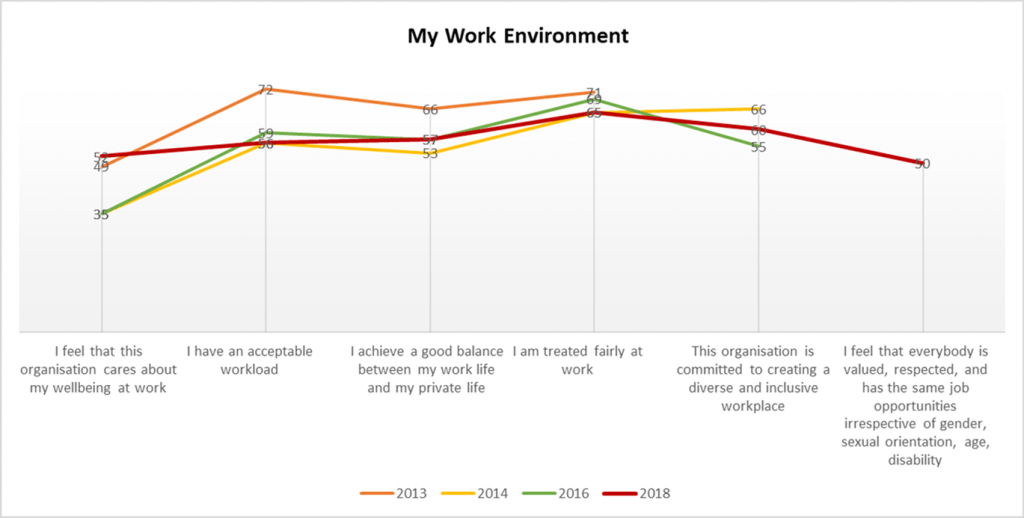
The budgetary requirement imposed by the Member States has created disparities between staff and has made it difficult for human resources departments to adapt quickly to the situation.
However, this implementation required an in-depth study of:
- Variability between staff in terms of working rates and patterns, etc.
- Workload or productivity targets taking into account actual working and its contingencies
- Taking into account learning time for new recruits, transfers, etc.
- The precision of the expected work objectives, the resources allocated and the area of responsibility of the staff
- Anticipating the use of additional resources already trained in the event of an increase in the workload
- The establishment of a training plan in accordance with the tasks to be carried out by the staff;
- Limiting overtime by properly distributing the workload within the team and ensuring recovery
Staff dissatisfaction
According to the results of the last four staff surveys (see graph 1 — working environment), staff are dissatisfied with their working environment, in particular the workload, work-life balance and inclusion and diversity.
Consequences
This has immediate consequences such as unpreparedness, delays, quality defects and a lack of work-life balance. The latter point emerges from the results of the survey.
Overflow is also one of the consequences. The concept of “cognitive overflow syndrome” reflects the stress and frustration expressed by many experienced “cognitive workers” who feel that they are submerged by information and lose control over their activity. They say that they “spend their time to settle details, do not manage to carry out their actual work” and that “urgency comes before the important”; ‘I’m overflown’ (Lahou 2002).
The difficulty of reconciling private and professional life has a direct impact on mental health such as mood disorders, anxiety disorders and substance related disorders (Frone, 2000).
The measurement of working time is all the more necessary given that since 2014 the weekly duration has increased from 37,5 hours to 40 hours, with no salary increase, and staff have stated that they are making additional efforts where necessary (95 % of hits — graph 2).
It is therefore a priority to have data on the workload, the number of hours actually worked, the intensity of work and its complexity for each service in order to detect, as a first step, overwork jobs and, secondly, to be able to better understand the consequences for mental health linked to psychological and physical demand. Close cooperation with the Medical Service is necessary in order to prevent all illnesses, whether physical or mental.
graph 2 – Role clarity and job content
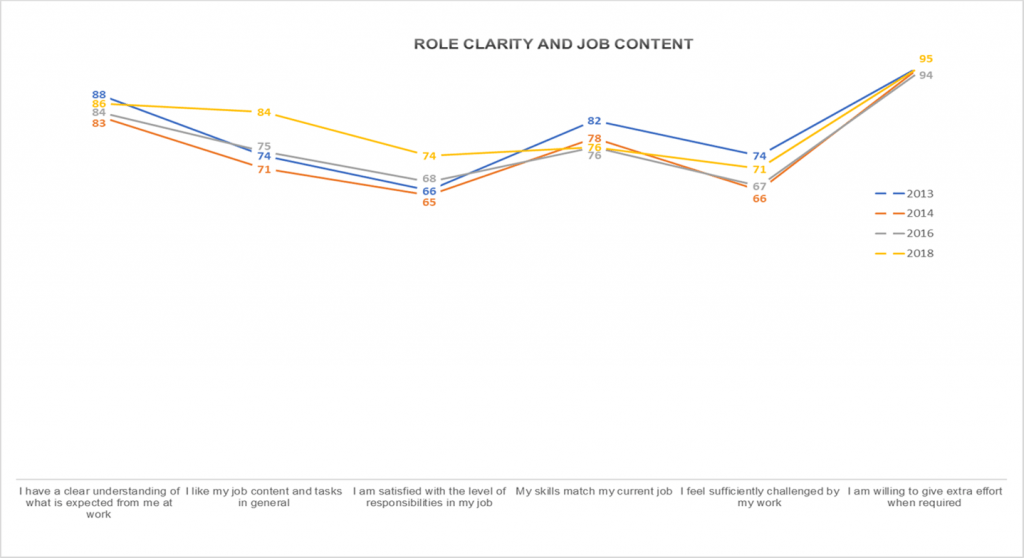
2. Emotional requirements
The media have an impact on the psychological health of staff even though the contact is indirect. It affects the individual in his integrity and in his relationship with the Founding Fathers Group based on European founding values. Staff are confronted with an attack on values and a project that they defend when they cannot defend themselves openly, in public. This requires strong emotional demands.
According to Boussard (2008), tense relationships with the public expose employees to a feeling of downgrading when the tension results from the sharp mismatch between what they do and what they should do. Tension with the public will be all the greater and poorly experienced if the employee concerned feels deprived of the means to act, impeded in his ability to respond to the needs and imperatives of the situation, for reasons connected with the almost irreconcilable contradictions in his task, owing to a lack of resources… Jaeger (2002) stressed that the fact that workers cannot respond to a situation and that they are treated as incapable because they are precisely placed in the incapacity to act is a humiliating situation and an impairment in the sense of work because they feel they are not doing good work.
Staff affected by this situation are in contact with suffering, must hide their emotions and sometimes they feel afraid and anxious about their own future within the institution.
R&D was the first and often the only trade union to defend the European project and the staff, both within the institution and at media level, going so far as to initiate procedures to restore the truth.
In order to reduce this factor, it would be essential for the EU to adopt a communication policy closer to the European citizen highlighting not only the values and achievements of the European project but also the possibility that he could participate actively in the development of the project. A denial would also be needed for any unfounded attack as well as any disinformation about the EU intended for the public, in some cases promoting the rise of Euroscepticism.
On the other hand, the necessary steps should be taken at the level of internal management and ethical rules to prevent any abuse which could undermine the image of the institution, its staff and fundamental values.
3. Conflicts of value
On the one hand, the EU is based on values of universalism and sympathy guaranteed by the work of staff. On the other hand, staff themselves do not benefit from these European values given that, since the two reforms, Member States care nothing for the impact of budget cuts on the health and well-being of staff.
In order to remedy this conflict established since the 2004 reform, and in view of the fact that billions of euros have already been saved in a few years, it would be high time to put People at the centre of the functioning of the institution and to establish a genuine social dialogue with its representatives!
4. Autonomy
Autonomy refers to the possibility for the worker to be active, and not passive, in relation to his work, his participation in production and the conduct of his professional life.
Good autonomy in the task
Staff with room for implementation, the content of their tasks and the objectives to be achieved have a high degree of autonomy in their work.
According to the results of the Staff Survey, the section “Clarity of roles and content of work” (see gra-ph 2), grouping questions relating to autonomy in the task, shows that staff are autonomous. They love the content of his work, believes that he has the capacity to carry it out, can meet the challenges sufficiently and is ready to make an additional effort when necessary.
Low predictability of work and ability to anticipate…
The“Change and Innovation” strand (graph 3) is quite critical.
Staff do not feel involved in decisions that affect them, nor encouraged to bring innovations to their work. There is no culture of change, although departments are forced to undergo constant reorganisations, particularly when the College of Commissioners is renewed. These reorganisations most often raise concerns about the future of staff. They are thus insecure and in a situation of subjective precariousness despite their status as officials. This is all the more the case for staff on temporary contracts who will survive these changes as a likely loss of employment.
Graph3 – Working methods
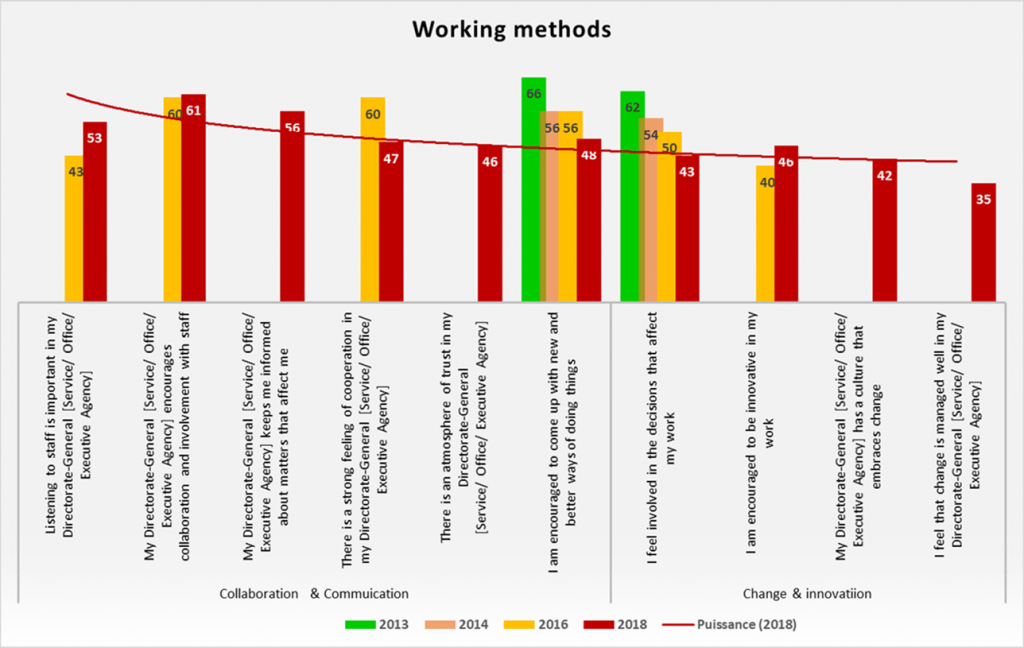
Building policy without involving staff
The building policy promotes the establishment of a new area of work in hot-desking and open space without involving the staff concerned and taking into account their views on these new working conditions.
This neutral workspace without an attractive office, requiring the clean desk, with swim lockers replacing the office cabinets and desk drawers confiscated to staff, becomes a working standard imposed on staff without having been given the opportunity to express themselves, putting them in front of the fait accompli. This is a factor of PSR causing physical and psychological illnesses reported by all experts!
R&D called on Danièle Linhart, Sociologue du Travail, director of emerite research at the CNRS, member of the GTM-CRESPPA * laboratory, UMR-CNRS-Universities of Paris 8 and Paris 10, to speak at the e-conference ““Hot-desking and “open space: what workspaces at the European Commission?” (replay) that has enabled us to better understand the current challenges on staff health and on that of the services concerned. For Danièle Linhart, “Flex desk and clean desk are anxiety-provoking for employees”!
The savings made by rationalising office space will soon be overcome by staff demotivation, underperformance, sick leave going as far as physical and mental illness.
Foster the cultural development, as well as the use, the increase and the valorisation of skills
Without cultural development or the acquisition of new skills, staff find themselves in a situation of progressive devaluation of their prior learning and professional qualifications, causing anguish and lowered self-esteem.
The staff of the European Commission is recognised at global level as an expert on European policies. This is one of the prides of belonging to the European project. If he is no longer able to share and value his knowledge and know-how, specific and related to the functioning of the European Union, they are in a situation which is devalued and painfully felt as such. On the contrary, fulfilling or enriching work that enables staff to increase their cultural or human capital contributes to well-being at work.
Staff training policy requires in-depth reflection in order to foster cultural and professional development. This would allow staff to consider new career and mobility perspectives.
5. Social relations at work
This axis covers social relations between workers and the social relationship between the worker and the organisation which employs him.
A better balance between effort and reward
In general, staff consider that they have received regular recognition of their work (graph 5). However, the future of work (graph 6) as well as the increase in workload since the transition from 37.5 to 40 hours and time constraints (effort) are in imbalance.
Graph 5 – Feedback & Recognition
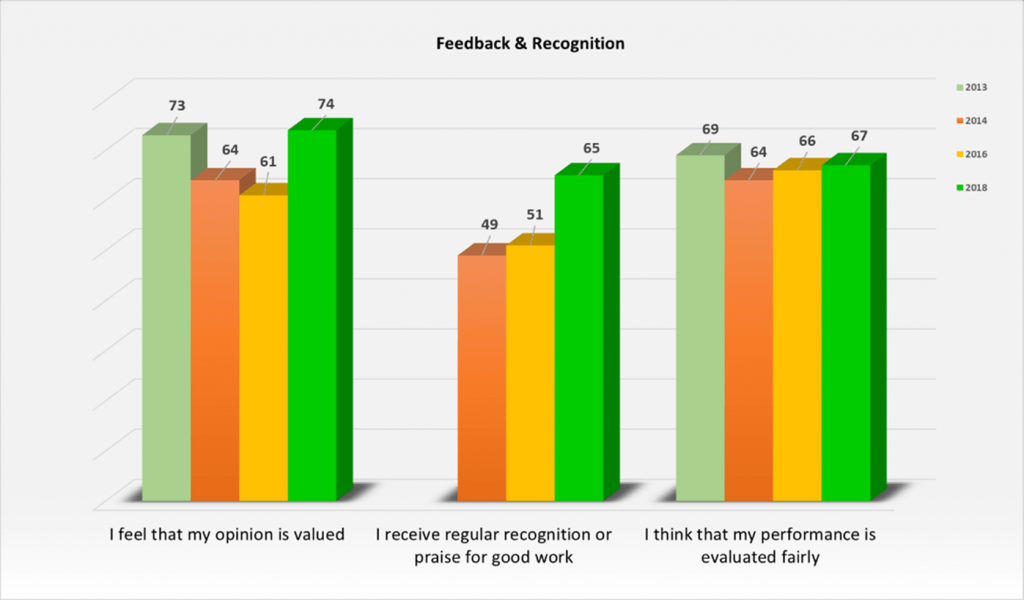
Better career prospects
Staff are dissatisfied with their professional future (graph 6). They do not use mobility, cannot manage their career choices, are not well informed about career options and the relationship between their performance at work and their career progression is not satisfactory.
Moreover, the appraisal and promotion exercise introduced a form of competition between staff that did not exist before the 2004 reform.
The evaluation is based on the prescribed work and not on actual work. The staff being assessed will therefore experience this exercise as a discrepancy between their perception of their work actually carried out with the full degree of finesse and the expertise they will have developed in order to carry it out and the perception of the line manager of the outcome of the work rendered without being able to assess it at its fair value. The assessment is not based on rigorous scientific data or on a methodology to make this exercise as objective as possible (see page 24 “ Psychosocial risks in the European institutions, and in particular in the European Commission”).
Although, in general, the work of staff is not recognised at the level of European citizens and although they are not satisfied with their professional future, which means that the institution does not recognise their work, staff are satisfied with the return and recognition of their line manager. This helps staff to overcome the other two negative factors.
The direct superior plays a very important role in this strand. If the “return and recognition” results were negative, it would be very likely that the institution would have to cope with an increased number of colleagues suffering from psychological and physiological conditions.
Graph 6 – Professional future
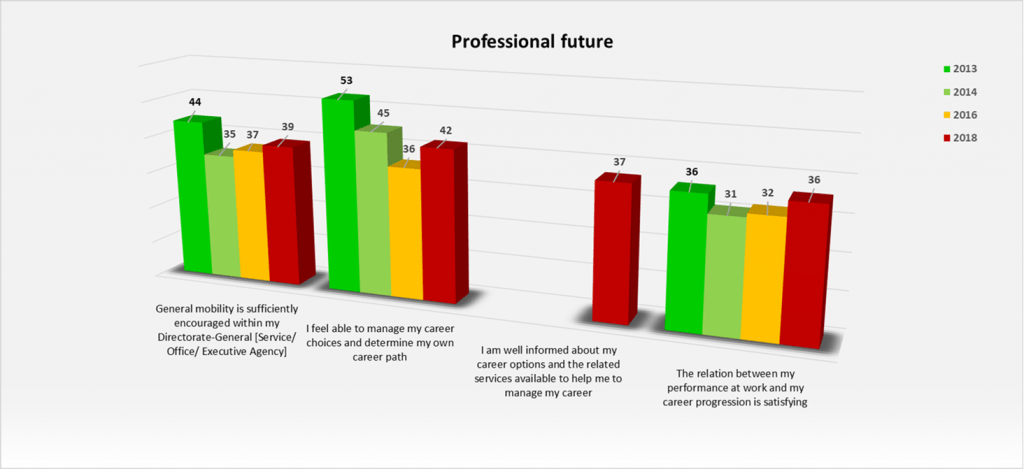
Better communication with senior management
According to the results of the various staff surveys under the “Senior Management” section (see graph 9), the relationship between senior management and staff is rather mediocre. It would be interesting to study the quality of these relationships and the real perception of staff. Would this be a failure in terms of control style, clarity and truthfulness of instructions or an organisational failure?
Exchanges between staff and senior management need to be strengthened. A more targeted and transparent communication policy would be necessary to restore the link and the active participation of staff in the various projects of the Directorate-General.
As Commissioner Hahn suggests, it is up to management to lead by example and to advocate a policy of trust, but this is far from being achieved!
Graph 9 – Senior Management
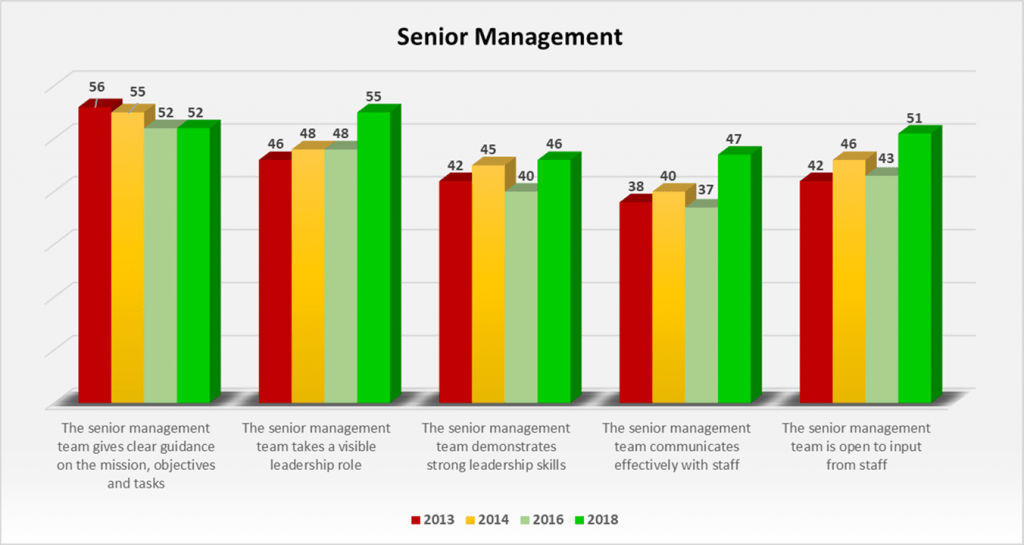
6. Insecurity
Job insecurity means socio-economic insecurity and the risk of uncontrolled changes in work and working conditions.
Staff face three forms of insecurity:
- Objective or precarious job insecurity and subjective precariousness or employment precariousness (see page 43 “Psychosocial risks in the European institutions, and in particular in the European Commission”),
- Career insecurity (see better career prospects)
- Changes such as reorganisations, building policy, the introduction of new staff policies, etc. (see building policy file, HR strategy file)
A number of symptoms of malaise at work are thus identified, such as work stoppages, absenteeism, sleep disorders, depressive states, musculoskeletal disorders, etc.
Conclusion
The European project is carried out by recognised professionals; women and men, with knowledge and know-how, trustworthy, persistent, ethically motivated, who have expatriated themselves to perpetuate the dream of the founding fathers and the Visionaries.
This European project would not have grown so fast without those women and men, whether they were officials, temporary staff, contract staff, agency staff, and so on. Each in her/his own way has made her/his contribution.
Staff think, first and foremost, that the lives of European and non-European citizens should be improved. Member States are primarily thinking of putting in place policies under budgetary constraints without measuring the impact on staff’s daily lives, working conditions, health and privacy.
Because of these various budgetary restrictions, the staff of the European Commission are subject to very important psychosocial risk factors that have emerged with the two reforms but also because of the image of the EU conveyed by the media and the conflicts of values created by some senior officials.
